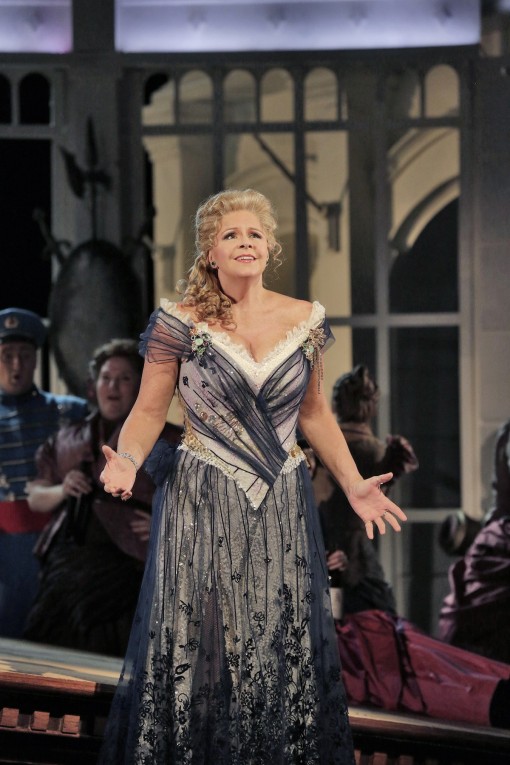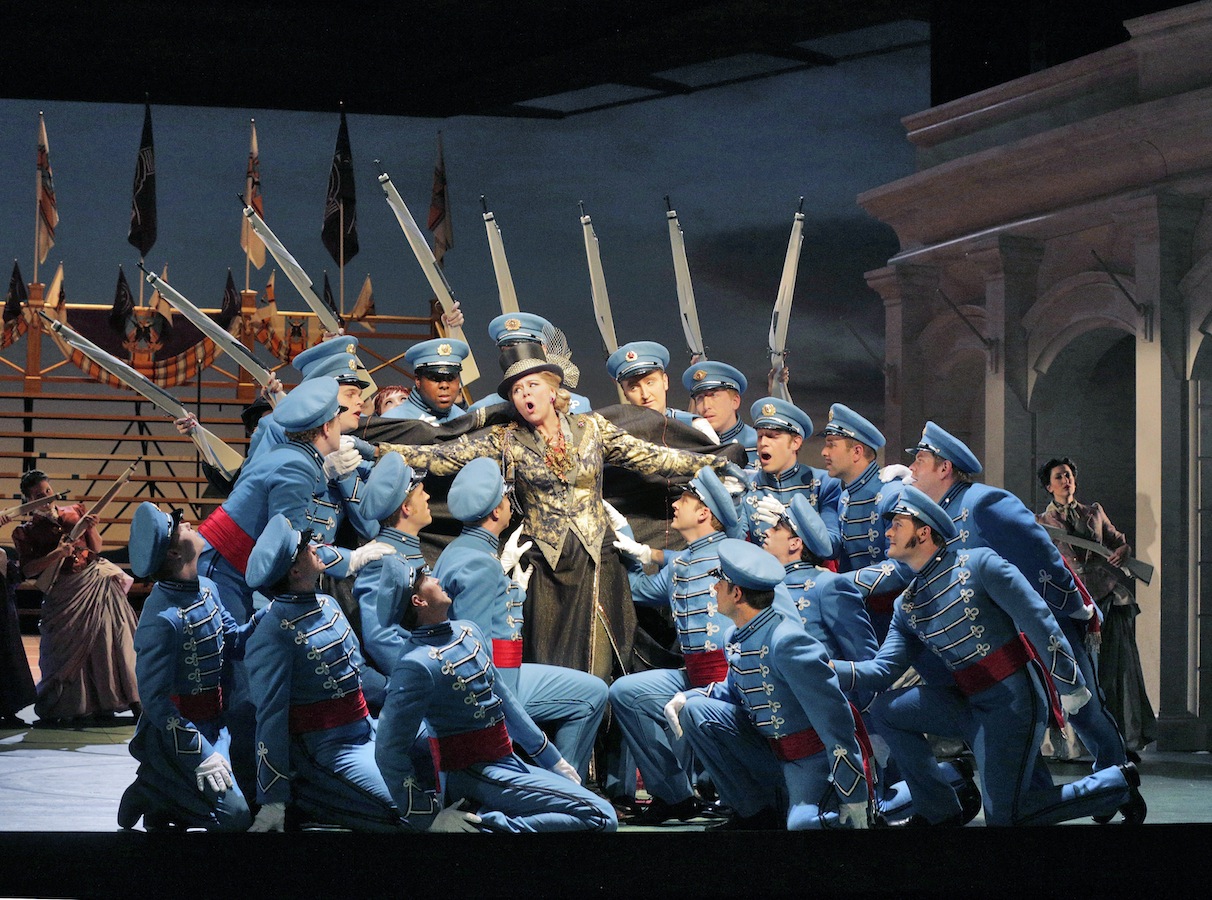Fizz is off the champagne in Santa Fe Opera’s “Duchess of Gerolstein”
Listening to three hours of an Offenbach operetta will likely cause a hangover, not unlike the one caused by all the champagne that is guzzled by the operetta’s characters. This was the lesson learned at the Santa Fe Opera’s new production of Offenbach’s La Grande Duchesse de Gérolstein, heard Tuesday night.
It is an odd feature of an odd season for the New Mexico company, a summer with Mozart, a Santa Fe favorite, but no Richard Strauss, the other festival regular; a season with a world premiere, but no 20th-century work, and instead of an opera before Mozart, an opéra bouffe from La Belle Époque.
By most measures, however, this production should be a success, beginning with the company convincing mezzo-soprano Susan Graham to bring some star power to the title role. Offenbach wrote it for a soprano, Hortense Schneider, but other mezzo-sopranos before Graham have done it, and Graham brought a keen sense of comic timing to it, although vocally she did sound a little thin and rough at times.
This Grand Duchess was neither young, as the libretto has her, or old, as she is often portrayed, but somewhere in the middle, with enough spirit in her to put off her marriage to the vain and fussy Prince Paul (former SFO apprentice Jonathan Michie, all shining teeth, floppy blond hair, and waving dandy’s cane) and make a move on a younger man in the regiment of the military school she supports. The advertisements for the opera even use an image of a cougar wearing a tiara. Yes, that kind of cougar, a concept acknowledged by the director in the program notes.
Fritz, the object of the Duchess’s affections, is a hapless cadet whom everyone picks on, brought to vivid, sad-sack life by tenor Paul Appleby in his company debut. This production sets the story in an unspecified location that evokes a small town in the 19th-century American Midwest and its rah-rah local military school. Appleby, who was sometimes hard to hear in the house, was charming and disarmingly funny as the unlucky, non-athletic young man, the towel boy who gets stuffed into a rolling cart by the jocks in the first act. (Like many schools, the Gérolstein Military Academy needs an anti-bullying program.)
Fritz’s real problem is that his marriage to Wanda (sung with silvery lightness by Anya Matanovič, another former Santa Fe Opera apprentice) is threatened, as the Grand Duchess shows her affection by raising him in rank from lowly private to exalted commander-in-chief. The Grand Duchess is all about lifting up male privates — countless variations of this joke and others of the same ilk are dotted throughout the spoken dialogue, translated and adapted into English for this production.
Gérolstein is taken into an absurd war, which Fritz will win through a ruse worthy of Odysseus, because the Grand Duchess, unmarried, needs to be diverted. Her tutor, Baron Puck (another former SFO apprentice, character tenor Aaron Pegram, with a funny southern drawl but sometimes almost inaudible when singing), and the imperious leader of the military, the explosively named General Boum (Kevin Burdette), do their best to keep the Grand Duchess in check. Burdette, a bass who made his Santa Fe debut in 2011 in The Last Savage, was by far the production’s best comic asset, with a well-honed repertory of sounds, grimaces, and body contortions, and a powerful voice to boot. His send-up of military discipline in the first act, Pif paf pouf, tara papapoum, complete with uproariously obscene pelvic thrusts and his terrorized cadets all in lock-step, was the funniest bit of the evening.
Among the supporting cast, second-year apprentice singer Sarah Mesko, an impressive mezzo-soprano, stood out for her plush sound and sassy stage presence. A group of dancers livened up the big choral scenes with cartwheels, lifts, and jumps during the restored Carillon number that ends the second act and the madcap Galop that provides a transition into the final scene.
Emmanuel Villaume, who has conducted the work in Los Angeles, was a calm presence at the podium, efficient more than inspired, leading the orchestra in a mostly clean, energetic reading of this often wild score. Rarely have so many notes been played to such short-lasting effect, the pop of a champagne cork and a little fizz. One hopes that the poor piccolo players, squealing away in number after number, were paid time and a half.
So why was this production, with so much going for it, something of a bore? By the end of the second act, it was easy to see why, not long after the work’s premiere, Offenbach made significant cuts to the score, especially in the last two acts. That shorter version of the score was the one most often performed, including the four times — four times! — that Santa Fe Opera mounted this operetta in the 1970s. Musically, the Santa Fe performance just did not have the same sparkle and vivacity, lacking in rhythmic tightness and bite.
The production, directed by Lee Blakeley, was also partly to blame. The shift of the story to an American setting did little other than justify the use of English dialogue. There were no particularly American jokes, considering that both the blind devotion to the military and the media phenomenon of the “cougar” could have yielded plenty. The sets, designed by Adrian Linford, were mostly nondescript, with some nice touches in Prince Paul’s absurdly long car and a reviewing stand that rose and sank at the back of the stage, providing a fun entrance for Susan Graham’s Duchess. The costumes, by Jo van Schuppen, were colorful, matched by the breathless choreography of Peggy Hickey.
This production continues at Santa Fe Opera through August 24. santafeopera.org


Posted Aug 17, 2013 at 3:58 pm by Raouf Zaidan
I agree with Mr. Downey that this production was boring. I would add that it lacked charm and grace and gave the impression of a lot of money wasted with little merit to show for it.